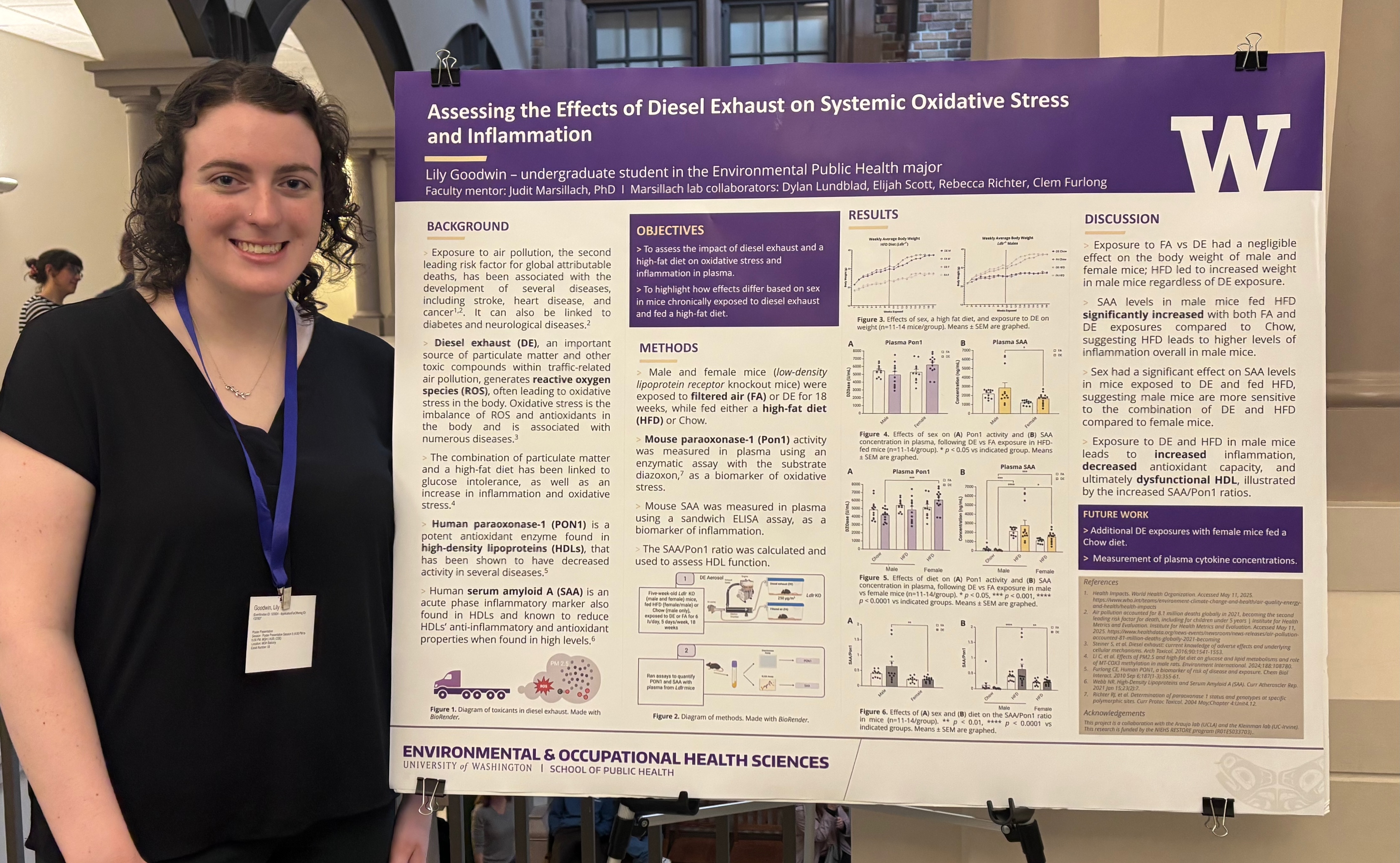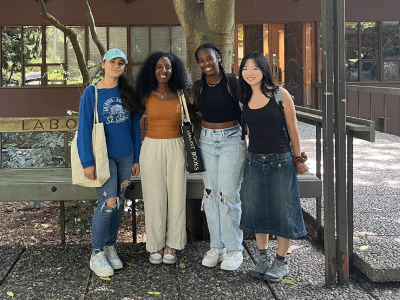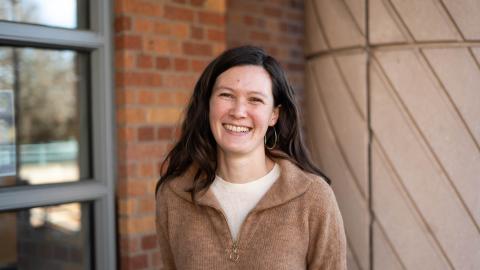One benefit of majoring in environmental public health at the UW is the chance to do independent research with guidance from expert mentors. This month, more than a dozen students in the UW Department of Environmental & Occupational Health Sciences (DEOHS) presented their research at two symposia on campus, the UW Undergraduate Research Symposium and the UW School of Public Health Undergraduate Symposium.
The events represented a culmination of the students' efforts conducting experiments in the lab, perusing archives and databases, and working with community partners to discover new findings in worker health, disaster preparedness, toxicology and much more.
Senior Charlotte Beatson worked with DEOHS Professor Christopher Simpson and others on a project focused on improving workplace air quality for people who work in the cannabis industry.
Beatson tested a ventilation system designed to clear local exhaust from cannabis growing facilities to see how well it controlled exposure to particulate matter and volatile organic chemicals.
During both cannabis grinding and mechanical joint filling operations, the ventilation system performed effectively, she found.
“As this field is relatively new, it was very exciting to see progress within my work and see its practical applicability in the field,” she said. “I also have had an awesome team of mentors and they have made learning and research so wonderful.”
Senior Emma Jane Bauer worked with DEOHS Professor Catherine Karr and others to assess screening tools for pregnant people’s risk of lead exposure in state health departments across the U.S. She created a centralized digital archive of these tools for use by healthcare providers.
Bauer appreciated working with the Northwest Pediatric Environmental Health Specialty Unit, part of DEOHS, on the project. “I was able to be a part of an organization that was making real impacts on how environmental health care is communicated,” she said.
Senior Lily Goodwin worked with DEOHS Assistant Professor Judit Marsillach to explore how exposure to diesel exhaust and a high-fat diet affected mice.
Using mice as a model for humans, she assessed the potential harm — including oxidative stress and inflammation — resulting from the combination of those exposures.
“It’s gratifying to have real-world applications for concepts and ideas discussed in my coursework,” Goodwin said. “I feel like I’ve really been able to build my skills from the groundwork laid by my courses.”

Sophomore Eden Bogale worked on an interdisciplinary project in collaboration with several other undergraduates across the UW to create a digital archive to preserve the stories of Black grandmothers, the Black Grandmother Worldmaking Library.
She was mentored by LaShawnDa Pittman, associate professor in African American studies and American ethnic studies at the UW.
In a project that began last summer with the Humanities Data Science Summer Institute, Bogale researched the history of two historically Black regions, the Central District in Seattle and the Gullah Geechee corridor in the South. She and her team created a map of historical and current Black-owned businesses in the Central District.
“I learned a lot about the presence of the Black community in the CD during the 1920s, 30s and 40s, and I was surprised how much isn't available to find easily online and how much work it took to find documents with the information we needed for our map,” she said.

Senior Abigail Hu examined how policies at the federal and Florida-state level “harm, restrict and impact the ability of undocumented (im)migrants to respond and recover from climate disasters, in the context of health,” she explained.
Hu worked on the project with the Harry Bridges Center for Labor Studies as an independent study, building on what she learned in the course American Ethnic Studies 442: Undocumented Immigrant Communities.
All student presenters
Uthayla Al-Arab and Andrew Phillips
Analysis of Wildfire Smoke Preparedness and Response Plans
Mentors: DEOHS Teaching Professor Tania Busch Isaksen and Research Coordinator Anna Reed
Naomi Alvarez
Investigating the Effect of Diesel Exhaust Exposure on the Development of Metabolic Dysfunction-Associated Fatty Liver Disease (MAFLD)
Mentors: DEOHS Assistant Professor Judit Marsillach and Research Scientist Ashley Phillips
Emma Jane Bauer
Compiling State-Specific Lead Risk Factor Screening Tools for Pregnant Individuals
Mentors: DEOHS Professor Catherine Karr and Environmental Health Specialist Margaret Willis
Charlotte Beatson
Establishing an Exposure Control for Particulate Matter and Volatile Organic Compound Exposure During Indoor Cannabis Processing Activities
Mentors: DEOHS Professor Christopher Simpson; Research Scientists Michael Paulsen and Callan Krevanko
Eden Bogale
(with UW students Sean Fan, Aulona Hoxha, Fal Efrem Iyoab and Rino Hamanishi)
Mentor: African American Studies and American Ethnic Studies Associate Professor LaShawnDa Pittman
Lily Goodwin
Assessing the Effects of Diesel Exhaust on Systemic Oxidative Stress and Inflammation
Mentor: DEOHS Assistant Professor Judit Marsillach
Abby Hu
Undocumented Communities in Florida: Conceptualizing Climate Disasters, Health, and Legal Violence
Kaidan St Louis
Food Fight! A Comparative Analysis of Nutritional Quality in Little Free Pantries and Community Fridges
Mentor: DEOHS Assistant Teaching Professor Emily Hovis
Nell Thompson
Transgender People’s Perception and Experience of Natural Disasters: A Review of the Literature
Mentor: Dwaine Plaza, Sociology, Oregon State University
Rhiannon Trunnell and Weiqhi Wee
Development and Optimization of a Membrane Filtration-Based Method for the Detection of Shigella spp. in Seattle Wastewater
Mentor: DEOHS Professor Scott Meschke
Ge-Sue Yang
Investigation of in vitro Co-culture Growth Dynamics in Periodontal Pathogens, Fusobacterium nucleatum and Porphyromonas gingivalis
Mentor: Jeffrey McLean, Periodontics



